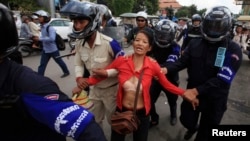Lawyers for seven imprisoned Cambodian activists have appealed for their release, following a swift trial and sentencing earlier this week.
The activists, all women, were arrested in front of city hall Monday as they protested the city’s inability to prevent flooding in the Boeung Kak neighborhood, where a contentious development project filled in a massive Phnom Penh lake and caused the evictions of thousands of families.
Sokunthea Sam, a lawyer representing the activists, says his clients did nothing wrong.
“I understand that they went to the municipality to request that the authority find [a] solution to the nasty water flood their homes. They didn’t plan to protest and block the road as they were charged. They went only to seek authority to find a solution to the nasty water,” says he.
Sokunthea Sam adds that he filed an appeal on behalf of his clients Thursday.
International rights groups and dozens of local organizations have condemned the jailing of the activists, who each received a one-year sentence and were fined $500 for disturbing the public order during a swift, one-day trial that came just one day after their arrest. Three others were convicted a day later after they tried to protest at the first trial.
‘Core rights’ violated
Phil Robertson, deputy director for Human Rights Watch Asia, says the arrests and swift convictions show authorities have a poor commitment to basic freedoms.
“What is quite clear is that the government has a very low level of respect for core civil and political rights like freedom of expression, freedom of assembly and freedom of peaceful association,” he said.
Ny Chakrya, lead investigator for the rights group Adhoc, says the arrests were not legal and that the government is using the courts to “pressure” activists.
He adds many such arrests happen near the end of most years, when the government is seeking aid from donors.
“That, if there is the land grab and there is the pressure to accept any solution that [the victims] must accept otherwise the government will use the court to arrest and pressure," he said. "And, second, I understand that every year the arrest of the community representatives always happens nearly before the end of the year because that can be a reason to use the victims as the exchange with the aid from the donors and free them.”
Government spokesman Phay Siphan declined to comment on the convictions.
Yorm Bopha, an activist from Boeung Kak who spent more than a year in jail on charges related to protesting, says she is calling on the international community to put pressure on the government.
“I wish to appeal to national and international community to monitor Cambodia as well as Boeung Kak community and as well as other communities because now the flood is happening nationwide and it is not allowing people to live, and it’s an intention of the municipality to make people not live peaceful lives," she said. "So, I wish for the international [community] to intervene and pressure the government to release all the activists immediately.”
'Thugocracy'
Peter Maguire, a professor and author who watches Cambodia closely, says that is unlikely to happen.
“Cambodian democracy was built on sand. The first UNTAC (United Nations Transitional Authority in Cambodia) election set the tone for the two decades of thugocracy that has followed," he said. "When Hun Sen acts undemocratically, the so-called “international community” makes hollow threats, the Cambodian prime minister calls their bluff, and the barangs [foreigners] cringe and then fold. It is a well established setpiece by now.”
The detention of the activists coincides with the arrest of Meach Sovannara, a prominent member of the opposition Cambodia National Rescue Party (CNRP), accused of insurrection for his alleged involvement in a July protest that turned violent.
In this case, too, Ny Chakrya says, a detainee was being used for political purposes.
“One method is that the arrest of Meach Sovannara is to pressure over the CNRP to soften its stance in accepting of what the CPP want," he said. "Second, this is issue related to July 15 [Freedom Park Protest] is a political motivated because the demonstration was non-violence, first, and, second, Meach Sovannara did not participate to attack and to wound the people at all.”
He says the arrest appears aimed at strengthening the ruling Cambodian People’s Party (CPP) position in negotiations over reform of the National Election Committee. Opposition officials say they are negotiating for his release.
The government spokesman, Phay Siphan, said the arrest was a judicial, not political, matter. The CNRP has representation in the National Assembly and is a “partner” of the government, he said.
Sok Khemara reported from Washington. This report was produced in collaboration with VOA’s Khmer Service.







